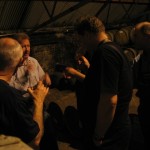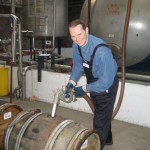 Monday’s shock news from the world of whisky was the press release, carried on Reuters’ newswire, that Remy Cointreau is in advanced talks to buy Bruichladdich. Yes, you heard me, the youthful, energetic, fiercely independent progressive distillers are talking about being bought by a multinational group.
Monday’s shock news from the world of whisky was the press release, carried on Reuters’ newswire, that Remy Cointreau is in advanced talks to buy Bruichladdich. Yes, you heard me, the youthful, energetic, fiercely independent progressive distillers are talking about being bought by a multinational group.
A number of questions might spring to mind, such as why is this news and why is Dav publishing opinions on the subject when he doesn’t normally chatter about current affairs on the internet and why’s he taken four days to get around to hitting the publish button. Mostly, this is published purely for sake of my own vanity and I get to be an over excited fanboi on the internet if I want to. Provided I don’t make a habit of it, of course. If by some faint chance of fate that somebody from Bruichladdich winds up reading this: Hello!
In the interests of full disclosure, I have exactly no knowledge of the situation apart from what’s in the public domain on the internet. I found out when Mark Gillespie broke the news on the Whisky Cast’s Facebook page, and have found out what’s going on mostly from reading twitter, the press releases and Remy Cointreau’s annual report and accounts.
I’m going to start with a tangent. Humans like stories and narrative. That’s why reporters tend to include people’s ages in news articles, to add human interest and engage with the reader. It gives the reader a greater sense of being involved and generally keeps marketing departments and packaging designers in business. People also like triumph against adversity, cheering on others who are putting in heroic efforts, to succeed despite the odds, for the sheer passion of doing what they want to do.
Single Malt Whisky trades heavily on the back story of how that drink came into being, the distillery’s unique history and buildings, the region and countryside, and maybe some of the people who made it, conjuring up poetic images that spark imagination which ultimately leads to more sales.

Jim McEwan in action
About 30 seconds later, I found myself in a total flap, trying desperately to think of intelligent questions to ask Mark Reynier, the charismatic and energetic CEO himself. I know I can go off on one, but oh boy can Mark talk when you get him started on a topic he’s passionate about and knows inside and out. This is the man who most credit with having this crazy idea of resurrecting a dormant distillery, who upon being told it was impossible by people in the business, went away, found some equally farsighted and courageous backers and went ahead and made it happen anyway. I won’t retell that story here, but if you don’t know it, then I encourage you to go buy Whisky Dream: Waking a Giant, it’s well worth reading in its own right.
 Anyway, one of the many characteristics that’s endeared many people to Bruichladdich is that it’s been fiercely independent, often poking a metaphorical stick at the multinational companies that dominate the whisky industry. I’m guessing that this is why reactions to this news have been somewhat polarised, with more than one negative opinion being voiced. But to flip that around, it seems harsh indeed to have to take flak for something you’re proud of achieving, but how successful should you feel if people get this excited if they perceive a risk to something you’ve helped build? After all people fail to get up in arms when other great distilleries and breweries change hands.
Anyway, one of the many characteristics that’s endeared many people to Bruichladdich is that it’s been fiercely independent, often poking a metaphorical stick at the multinational companies that dominate the whisky industry. I’m guessing that this is why reactions to this news have been somewhat polarised, with more than one negative opinion being voiced. But to flip that around, it seems harsh indeed to have to take flak for something you’re proud of achieving, but how successful should you feel if people get this excited if they perceive a risk to something you’ve helped build? After all people fail to get up in arms when other great distilleries and breweries change hands.
Lets not forget for a moment that we’re talking about a business, with shareholders, a board of directors and employees (who I think are also shareholders). Admittedly, these people were more in it for the passion rather than a calculated risk on a financial return, but business is still business. In the world of business, things change. People are generally allowed a reward for years of hard work. To me, it seems a positive step if somebody makes an offer the shareholders cannot refuse, and can contribute an international distribution and logistics system that would let the distillery focus on the creative business of turning out a fantastic dram and not have to waste energy on the paperwork required to get the product to market.

The Bruichladdich Still Room
In my opinion, many people’s reactions remind me of the Change Curve: Shock, Denial, Fear, Anger, Understanding, Acceptance. Give it a few weeks after the deal’s finalised and the world fails to end, and I think things will quieten down again.
I don’t think it’s a terrible time for Bruichladdich to change gear. They’ve spent 11 years re-establishing the brand, building a unique product range and they’ve been working for long enough that their mainstream product is now of an age for some real volumes to come online. I suspect there’s still a bit of innovation still to come out of Jim’s tasting lab, but backed up with the confidence of being able to supply a higher volume than before. I can’t believe that Remy Cointreau would be daft enough to break something they’ve just invested £undisclosed in and even if they did ruin the distilling process overnight, it’ll take another 10 years for the product being marketed to change and that’s more than enough time to buy several lifetime’s supply.

2003 Octomore at 180 litres per minute
But further into the future? Who knows. Myself, I’m quietly confident and to Mark Reynier, I will raise a small dram of the precious Octomore I was lucky enough to put into its Chateau Y’Chem barrels for its last 6 months maturation and fail to remember the toast I was taught one Thursday night on Islay..
Slainte!